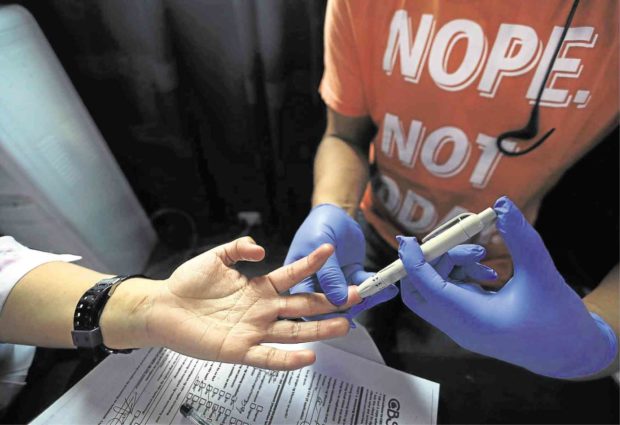
A woman undergoes HIV screening through a mobile service offered by the group H&ASH. —LYN RILLON
A pilot program of the Department of Health (DOH) designed to prevent the AIDS-causing human immunodeficiency virus (HIV) from further spreading in the country appears to heed the saying that an ounce of prevention is worth a pound of cure.
Called Pre-exposure Prophylaxis (PReP), the program features a pill that program participants were expected to take on a daily basis, according to health and program officials.
Health Secretary Paulyn Ubial said PReP was meant to protect members of a particularly vulnerable group known as men having sex with men, or MSM, who are not yet sick with HIV.
“The pill is taken the way people living with HIV are also taking their own pill,” said Dr. Gerald Belimac, program manager of the DOH Philippine National AIDS Council.
He said PReP had been implemented in many countries where it had been shown to be a powerful HIV prevention tool.
According to the World Health Organization (WHO), clinical trials have shown that PReP, if applied properly, can provide nearly complete protection from HIV infection. Success results, though, could vary according to how the anti-HIV drug was taken.
PReP is being tested by a private community-based organization and DOH partner in Mandaluyong City, Belimac said. The organization provides the drug while WHO exercises “rigorous supervision,” he said.
The program, which started only last month, targets 200 healthy men who have sex with men.
“We are evidence based,” Ubial said. “If the evidence will show that it is effective, we will explore using that strategy in the future because there’s a different context for every population group.”
She cited condom use as a strategy that might not be applicable as an HIV prevention tool for “some population groups.”
She said, though, that the PReP pill had not been found to prevent other sexually transmitted diseases. “So the MSM who are under PReP are still vulnerable to other sexually transmitted infections that can also lead to death,” she said.
Male-to-male sex remains to be the main mode of HIV transmission in the Philippines, according to DOH data. Of 38,114 HIV cases reported from January 1984 to October 2016, a total of 28,947 belonged to the MSM category.